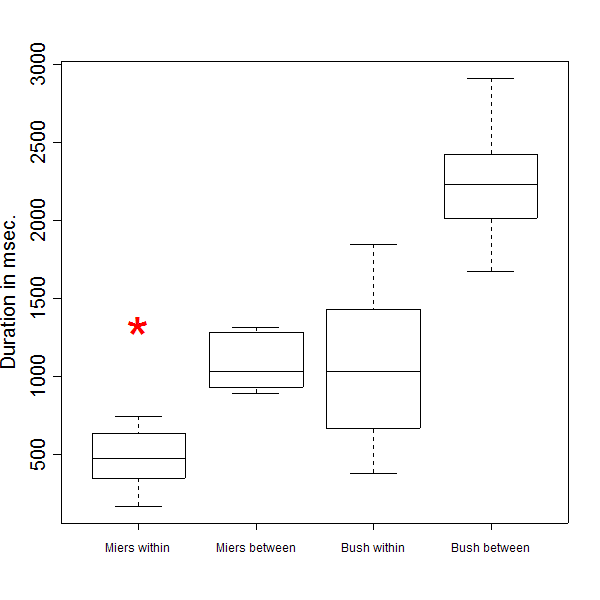October 06, 2005
Linguistic mens rea
Did Harriet Miers know she done wrong? When I wrote yesterday about her mistake in subject-verb agreement, I suggested that she signaled her awareness of the error with an extra-long pause:
The wisdom of those who drafted our Constitution and conceived our nation as functioning with three strong and independent branches have proven [1330 msec] truly remarkable.
I don't like to leave that kind of statement hanging out there without some empirical support. So I transcribed her speech as a whole, and made appropriate measurements, duly reported below the fold.
The core of Miers' remarks -- omitting the thank-yous and such -- took 112.236 seconds ("From my early days" to "our constitutional system"), during which there were 17.84 seconds of silent pause, 16% of the total time. She paused 39 times. 33 of these pauses were internal to sentences and 6 were between sentences. The transcribed segment comprises 198 words, for a rate of 106 wpm overall, or 126 wpm during the non-silent regions.
For comparison, I also transcribed and measured a comparable segment of George W. Bush's preceding remarks -- 125.068 seconds (from "In our great democracy" to "the cause of justice"), during which there were 47.566 seconds of silent pause, or 38% of the total time. He paused 30 times, of which 17 were internal to sentences and 13 were between sentences. The transcribed segment comprises 284 words, for a rate of 136 wpm overall, or 220 wpm during the non-silent parts. In his prepared speeches, W uses long pauses, adding up to an unusually large fraction of the total time; but in between the pauses, he speaks pretty fast.
Here's a boxplot that shows the distribution of durations of silent pauses in Miers' speech, and also in a comparable segment of George W. Bush's preceding remarks -

The line in the middle of the box in the leftmost column shows the median value of Miers' within-sentence pauses: 465 milliseconds. The bottom and top of the box show the 25% and 75% percentiles, respectively: 343 and 620 msec. The "whiskers" show the extreme values (excluding the pause after "have proven") -- 169 and 744 msec. The other columns of the plot show Miers' between-sentence pauses, and the comparable distributions for Bush's pauses.
The big red asterisk in the first column of the plot is the duration of Miers' pause after "have proven" -- 1330 msec. This is 2.9 times larger than her median within-sentence pause length, and 1.8 times larger than the next-longest example. In fact, it's larger than her longest between-sentence pause.
In my earlier post, I theorized that Miers' might have made the error in a distracted moment, and then regretted it. On reflection, I think it's just as likely that someone else wrote the speech for her, and she didn't notice the error until she read it out loud. In either case, it seems likely to me that the extra-long pause after the error is a symptom of regret. It must have been painful for her to make this mistake in such a public forum, given the reports that she is a fiercely detail-oriented editor of others' texts.
I'll also note in passing that the striking difference in rhetorical rhythm between the two speakers, noted in the waveform display in my earlier post, is displayed in a different way in these measurements.
Back in January, Geoff Pullum wrote about a similar sort of agreement error that he found in the newspaper. Some commenters in another web forum complained about this:
Sorry kids, you can't be an apple and an orange, and if you're a descriptivist, and someone honestly makes a sentence, that's an honest sentence in the language that actually is.
In response, Geoff explained the facts of grammatical life in simple terms. Some readers may again be puzzled about how linguists, who sometimes seem to feel that "whatever is, is right", can at other times be so certain that something is an error.
Concerns about grammar and usage fall into several categories. There are violations of nonsensical "principles" hallucinated by some self-appointed arbiter; there are differences between linguistic innovations and conservative norms; there are differences between standard and non-standard dialects; and finally, there are genuine errors.
The genuine errors -- slips of the tongue or the mind -- usually reflect some local confusion of the speaker or writer, who chooses a form or structure by mistake, as if absent-mindedly discarding the apple slices and putting the peels in the fruit salad. In English, one common confusion is using a plural verb form with a singular subject, under the influence of a nearby plural noun that is not the subject.
Language cranks treat all these categories of phenomena in the same way, as crimes against the laws of correct language. Linguists distinguish them according to their several kinds, and try to offer advice suitable to the situation. It may be prudent to avoid running afoul of imaginary strictures, though some may choose to defy them on principle; the choice of innovative or non-standard forms should be made mindfully; but mistakes are just mistakes.
Harriet Miers made a mistake, and she knew it as soon as the words were out of her mouth.
Posted by Mark Liberman at October 6, 2005 11:32 AM